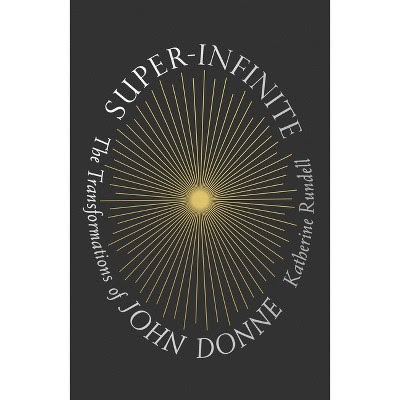I received an unexpected book for my birthday: "Super-Infinite: The Transformations of John Donne", by Katherine Rundell. I'm slightly embarrassed to admit that, despite being an English Lit major, I wasn't completely sure just who John Donne was: I recognized the name, but I don't think I read anything by him in school, and couldn't even tell you what century he lived in.
Given that lack of understanding, this turned out to be the perfect book for me. It's kind of a mix of biography, literary criticism, collection and history. It's a relatively short book and itself is written really well, forcefully making claims and backing them up with vivid language.
The book is also pretty perfect for me because, it turns out, John Donne is mostly known as a poet, and I'm not very well versed in poetry - I admire poetry in the abstract, but have a really hard time connecting with it in practice. At first I thought this might be a collection of Donne's poems, and if that was the case I probably would have bounced off of it. Instead, Rundell introduces the context in which Donne was writing, shares brief stanzas of his writing, and cogently draws out what was so startling and refreshing about it.
Donne was a contemporary of Shakespeare; it isn't clear whether they ever actually met, but they definitely moved in the same circles of London, spanning the reigns of Elizabeth I through James and Charles. Shakespeare is mostly remembered for his plays but also wrote popular sonnets. Donne moved through several different phases of literature during his life. As a young man he wrote poetry; what you might call "love poetry", but even today it's weirdly raw, visceral, engorged, overflowing. At a time when most poets were singing the praises of their beloved in the most ethereal, spiritual way possible, Donne was focused on bodies, on sex, on desire and panting and ecstasy. And while his contemporaries were writing courtly verse with elegant meters and expected imagery ("Oh how my love / Is just like a dove"), Donne broke free of these staid forms, and used unexpected, attention-grabbing metaphors that haven't been used before or since. His poetry collected a lot of indignation and scolding from literary peers in his lifetime and after, but it also made a deep impression on people, lodging in their brains... the evidence of that being that folks are still reading about him over 400 years later!
Near the end of his life, Donne became, rather improbably, a preacher: Dr. Donne was appointed by James I to be the Dean of St. Paul's Cathedral in London, after a successful career preaching at other churches around London. It seems like quite a leap from an oversexed Catholic boy to a dogmatic Protestant man, but you can tell that it's the same person: in both mediums he was trying to communicate something important to his audience, and deploying terrific imagery and words to do so. His sermons were very popular; in one instance, three men were nearly trampled to death by the eagerness to see him. And much like his earlier verses were copied and passed around between friends, so his sermons were recorded and re-read over the coming week.
In between his early poetry and his late sermonizing, Donne led a very full life. He trained as a lawyer, and worked hard to try and work his way into the royal court, without ever really succeeding. He was thrown into prison after marrying the 17-year-old niece of his employer, then proceeded to have 12 kids with her over the next 16 years. He served in several military expeditions. He also did a lot of writing, including some very obtuse metaphysical treatises and a shocking defense of suicide.
Rundell obviously greatly admires Donne's writing, but she doesn't airbrush any of his imperfections. While his love of Anne seems to have been genuine and lasting, it was also fairly squicky, as they married when he was 30 and she was 17, and their marriage removed her from a life of comfort and support to one of poverty and almost constant pregnancy. John doesn't seem to have been a good father: he wasn't very present for his kids, and only mentioned them when they were born, when they died, or when they were especially annoying. Those of his kids who survived to adulthood seemed to have turned out poorly, variously convicted of manslaughter and embezzlement and other crimes.
I guess that's kind of the inevitable conclusion of a lot of literary/artistic biographies: "This person did some terrible things, but their art is still really great, and worth experiencing today." While Donne had faults, it does seem like, for the most part, he was honest: honestly grappling with God, with desire, with his personal ambitions for fame and money and comfort.
I was pleasantly surprised by how readable the Donne excerpts in this book are: I think they're closer to modern English than Shakespeare is. Part of that is because Donne was creating modern English: a lot of our words were first invented by him, as well as some of our best-known phrases ("No man is an island"). So, it turns out, I did known John Donne after all!

No comments:
Post a Comment